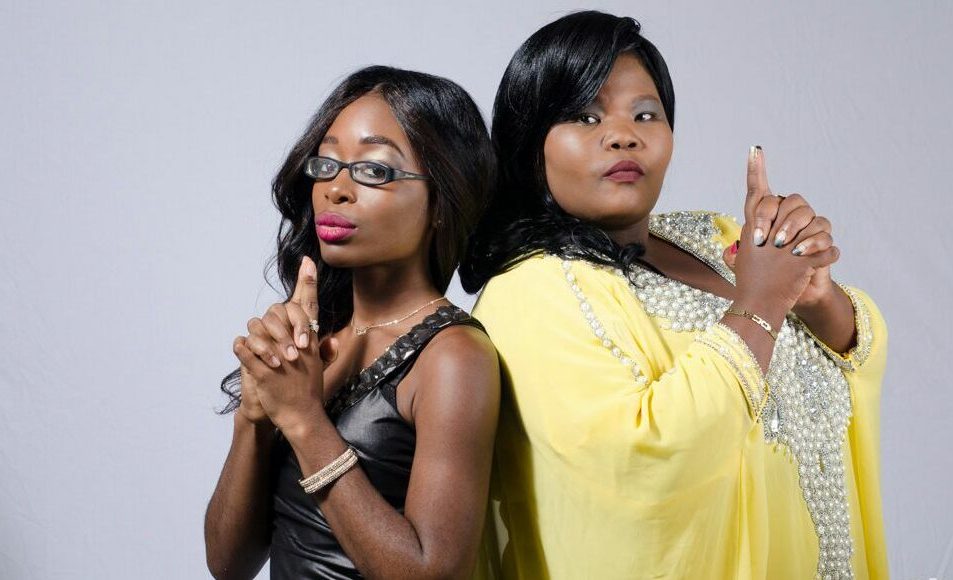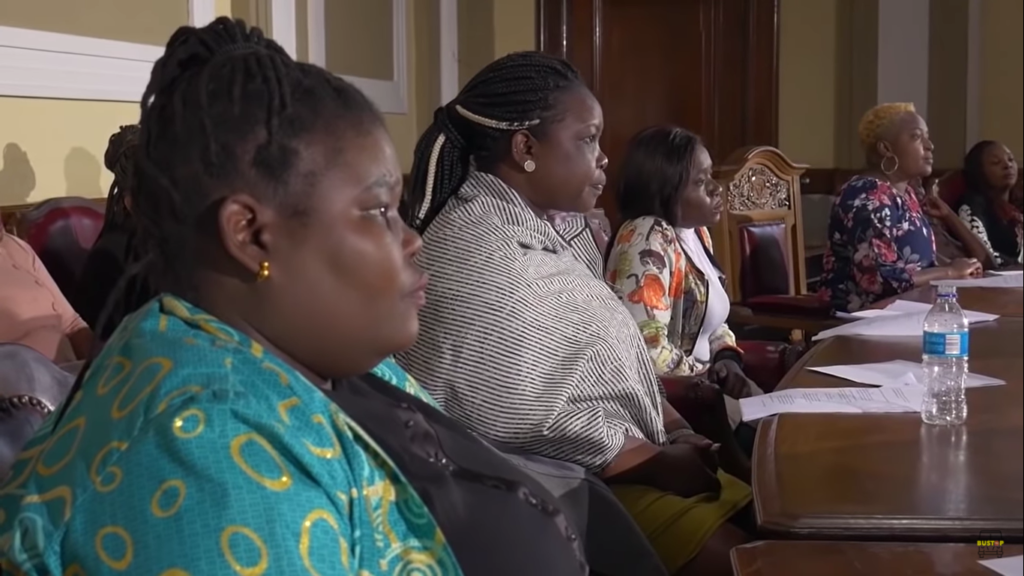Samantha “Gonyeti” Kureya and Sharon “Magi” Chideu have been creating humorous and satirical content tackling the day-to-day issues affecting ordinary Zimbabweans for nearly a decade.
Mention Gonyeti and Magi and you will get knowing nods and smiles in response. Kureya chose Gonyeti as her stage name with reference to the size of her body – Gonyeti is street slang for the size of haulage trucks. Chideu goes by Magi, which is short for magirazi, the Shona word for the glasses she wears.
The duo produces viral skits that highlight untold stories for Bustop TV, a local online news outlet.
“We are the mirror of society; the voice of the voiceless. We tackle current affairs, politics, religion, and many other issues that affect the day-to-day lives of people,” Kureya told AWiM News.
“As a result of the repressive political environment in the country, people are afraid to speak their mind and express their concerns, so we use humour and satire to tackle these issues. In some instances, the government makes announcements that affect citizens, so we use satire to hold the government to account,” said Kureya.

Acting has always been a part of Chideu’s life.
“I was a member of the drama club. I was a very quiet girl, but whenever I was on stage, I was very comfortable. As soon as I stepped in character, I would forget everything else,” she told AWiM News.
Years later, she and her co-actor, Kureya, play a pivotal role in promoting government accountability through satire. After school, Chideu studied film and joined Bustop TV thereafter.
“The skits we created opened my eyes to the things happening in my backyard. I started to see Zimbabwe through a different lens. I saw corruption at every level of society: You have to pay a bribe or ‘know someone’ to get a passport or driving license. I wanted to do something about this,” said Chideu.
In 2020, Bustop TV partnered with the Women’s Academy for Leadership and Political Excellence (WALPE) to launch a web series called All Female Parliament. The series showcases a women-only parliament that tackles the issues that affect women, as a way to promote the participation of women in politics. It visualises the possibility of real and tangible change and progress for women. While it had good reviews during the pilot phase after premiering in October, it was disrupted by the COVID-19 pandemic.
“Most women are used to men being in power and making all the decisions, while we (women) take a backseat. The series shows young women that this could be us in positions of leadership,” said Chideu.
The series uses humour and satire to illustrate women participating in decision-making and tackling issues affecting their lived experiences in their own safe space.
WALPE Program Officer Batanayi Mapinde told AWiM News that although the constitution promotes equal representation, women, who make up more than 50 per cent of Zimbabwe’s population, are not represented in most leadership positions.
The constitution of Zimbabwe amended in 2013, supports 50/50 representation and allows women to participate in parliament through proportional representation, which reserves 60 seats for women.

Between 2008 and 2013, the number of women in parliament doubled from 17 per cent (124 women) to 35 per cent as a result of the quota system that was introduced in 2013. In 2018, the number of women in parliament fell to 121.
“Women are the backbone of society; they run households. If women are capable of running a household, they are capable of taking responsibility at national level. They can occupy more seats in parliament and become ministers,” said Mapinde.
“The All-female Parliament shows that if women are given the opportunity to take majority lead in parliament, they can address the challenges that affect women in all levels of society,” she added.
While Zimbabweans are gradually warming up to consuming news online, the high cost of data has kept the series from reaching most of the intended viewers, many of them in low-income and rural communities.
“We broadcast from the internet and our greatest challenge is the huge cost of data to access the internet. It is beyond the reach of many of our potential viewers. We get fewer views than expected and that impacts our work,” said Chideu.
Enemies of the state
The other challenge, said Kureya, are threats and intimidation from the state.
In August 2019, Kureya was abducted by state agents and tortured. They took her from her house, stripped her, beat and assaulted her, forced her to drink sewage, and dumped her a few kilometres from her neighbourhood. Her crime? Creating content that “mocks” the government.
Kureya still suffers the effects of the physical and emotional torture she suffered in the hands of her captors.
“There is no freedom of expression in Zimbabwe. The media is not free. We are not free to express ourselves without fear of arrest, abduction, torture and harassment,” Kureya told AWiM News.
On numerous occasions the Bustop TV team, which includes other actors and producers, has been arrested and called in for questioning about their content by the police. Kureya was once arrested for wearing police uniform in one of their skits.
“Our content mirrors society, but we have been accused of being partisan. At one point we were barred from covering state events. We have been labeled enemies of the state just because we speak our minds,” said Kureya, adding that their families fear for their lives and want them to stop.
Moreover, 10 years into their efforts, many take the duo’s work as a joke.
“Most people think what we do is a hobby. They ask: ‘What else do you do?’ And I say, this is it. This is my job. It is serious work,” said Chideu.
The show must go on
The Bustop TV duo say that state interference has stifled their work and thwarted growth of online media and independent content creators in Zimbabwe.
“We have lost revenue because many companies we used to work with no longer want to work with us. They are afraid of being labeled enemies of the state,” said Kureya, adding that sometimes they do pro bono work.
However, they are not about to stop, despite the difficult operating environment.
“This is something I want to do. It is my job and I’m doing it. I have taken a stance. I am not going to stop,” said Chideu.
Send your thoughts and feedback on this story to editor@africanwomeninmedia.com
Subscribe to our newsletter to receive news, opportunities and updates [wysija_form id=”1″]



